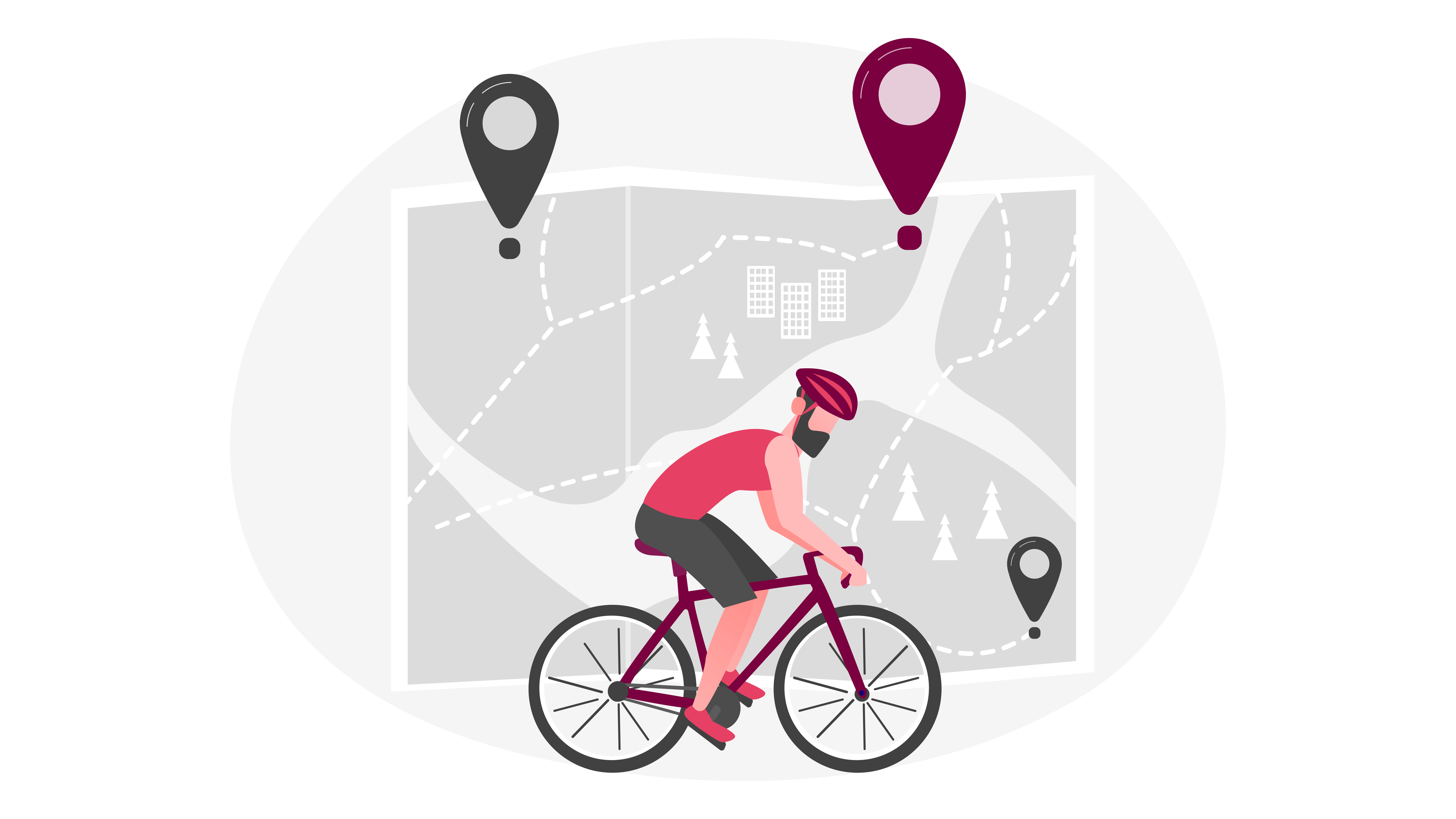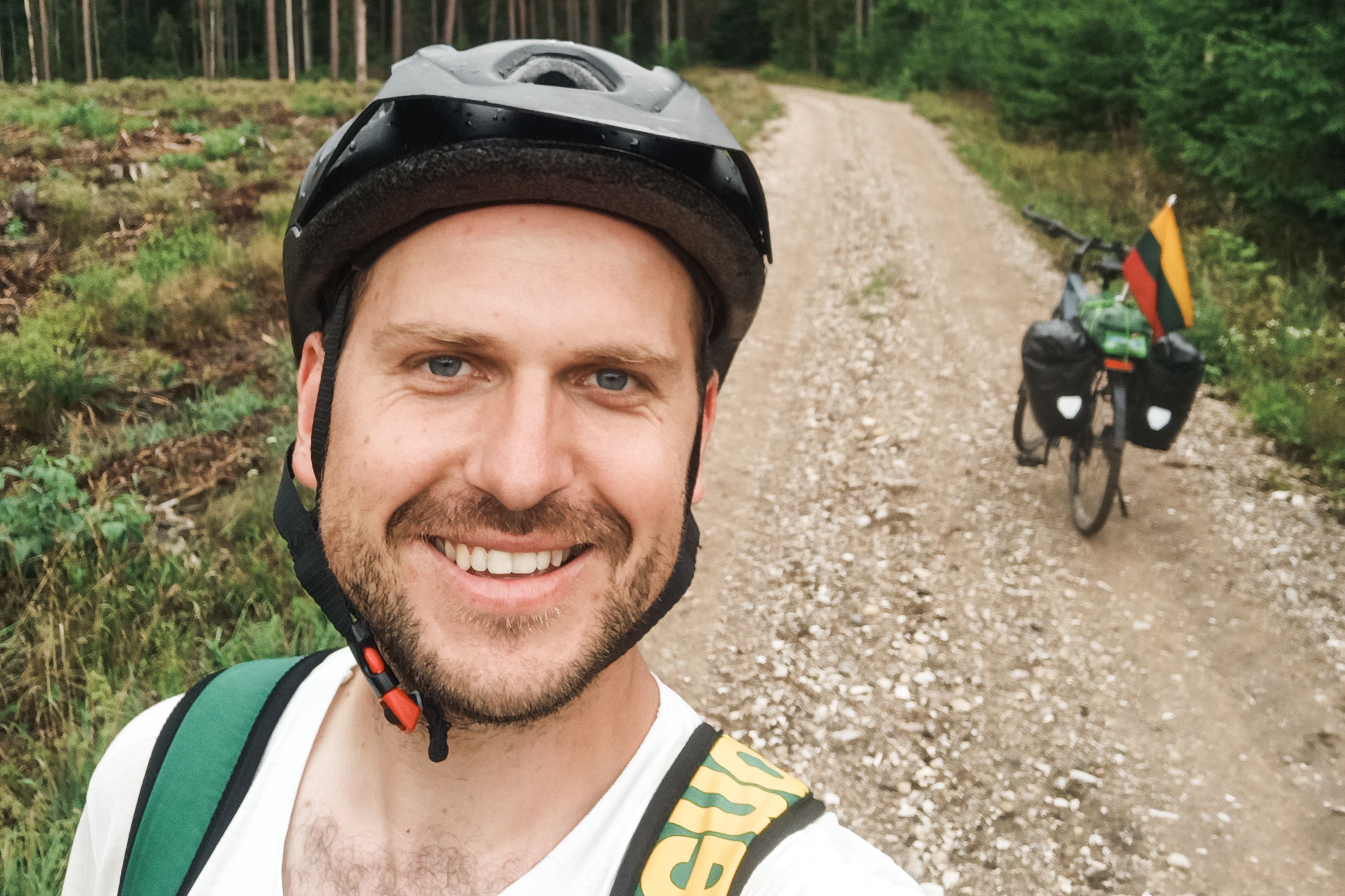Cardiology Resident at VU Faculty of Medicine Edvardas Jukna Cycled across Lithuania: “I Realised What Abundance There Is in Our Lives, but We Don’t Appreciate It”

“If you have a roof over your head, that’s great. If there are walls and windows and it’s not cold, that’s great comfort. If you have warm food to eat, that’s a huge advantage. Simple, mundane things that you don’t even think about on a daily basis become the most important things on such journeys,” said Edvardas Jukna, who realised one of his dreams this summer to cycle across Lithuania. We are talking with E. Jukna about his spectacular journey and about his professional path, his decision to study medicine in Kaunas and then to choose the Cardiology Residency Programme at the Faculty of Medicine of Vilnius University (VU).
An unconventional path to medical residency
Back in school E. Jukna had a penchant for natural sciences. “My sister is a doctor, so I followed in her footsteps. If you ask me why I chose the Lithuanian University of Health Sciences in Kaunas, the answer is simple: again, my sister studied in Kaunas, so I chose the same university. Well, now I am at VU Faculty of Medicine, and I am very pleased with it. I think it’s good to try different environments and schools,” he explained. When studying medicine, resident is always motivated by study assessment, by being able to meet the required standards, and by seeing how the baggage of knowledge and experience is gradually accumulating. “On the other hand, the experience in the medical residency programme, where you directly meet patients, are able to solve some problem, help a person, and then earn gratitude, really gives you a boost,” he added.
“I particularly appreciate the opportunity of a year of Erasmus studies in Austria and my internship in Germany. After completing studies in Kaunas and abroad, I wanted to try something new again, so I chose VU Faculty of Medicine. In fact, when I completed my studies in medicine, the Covid-19 pandemic started. I spent a couple of years working in admissions departments in the hospitals in the north of Lithuania (I come from Pakruojis). I worked with therapeutic patients and also gained a lot of experience in cardiac pathology. For example, in the admissions department of Šiauliai Hospital, resident doctors had to give a hand in restoring a patient’s heart rhythm, if the cardiologists were super busy,” E. Jukna told about his “unconventional” path to cardiology.
In Germany, his practice in cardiac surgery showed how closely cardiac surgeons and cardiologists work (according to E. Jukna, cardiology today is very advanced and is constantly looking for minimally invasive ways of solving surgical problems). So his experience in the admissions departments in Lithuania determined his final decision regarding his medical residency. “I was not aware that cardiology would be the area of my specialisation, it came organically with practice and experience,” resident noted.
When asked if he has ever thought of pursuing a scientific career alongside his medical profession, E. Jukna replied that he is not actively thinking about it, but is pleased with the opportunity to participate in various scientific projects: “At the moment, together with researchers from the Centre of Cardiology and Angiology at VU Hospital Santaros Klinikos (Prof. Audrius Aidietis, project lead, Justinas Bacevičius, a PhD student at VU Faculty of Medicine, an interventional cardiologist-electrophysiologist, and other specialists), we are conducting a state-of-the-art study using innovative devices trying to identify the risk factors that could cause atrial fibrillation. This pathology is very common and the number of patients with this condition is increasing. However, the causes of atrial fibrillation are not exactly known. It is very exciting to be part of this project, which also includes scientists of Kaunas University of Technology.”

A challenging journey across Lithuania
E. Jukna also draws experience from life’s challenges, one of which is cycling across Lithuania, the dream he has fulfilled this summer. “I came up with the idea eight years ago when I was in my second year of medical studies. Coming from a small town and studying in Kaunas I felt that I was starting my independent life here and was free to make decisions and do whatever I wished. So I thought it would be interesting to cycle along the border of Lithuania,” E. Jukna said. Initially, he planned to travel with a friend, but for various reasons this did not work out and the idea was put on the backburner. “I probably wouldn’t have come back to it, had I not been in the residency programme in the port town of Klaipėda in spring. I started cycling longer distances there and saw that I could do 50-200 kilometres a day. Of course, it was much easier to cycle there as there were few difficult uphill sections, and the cycle paths were excellent. I was also lucky to get two weeks off this summer, so it was a great opportunity to get back to the cycling idea,” traveller explained.
A single cycling tour can give you an idea of how different Lithuania really is. “You can see all contrasts and experience rarely visited outlying areas,” he said. His journey lasted 12.5 days. On day one, he managed to cycle 124 kilometres. “Cycling close to the Belarusian border felt compelling: imagine the night, full moon, darkness, and cameras every 10-20 metres (you can spot their red lights), swamps reflecting the moonlight, and wild animals jumping into the swamps. It seemed Belarus was just five steps away. But I was not brave enough to make them,” traveller shared some of his impressions.
The turning point was on day four or five: “I felt pain in my knees. Luckily, it went away and didn’t recur for the rest of the journey.” On day six, traveller managed to cycle the longest distance 200 kilometres. “When I reached the town of Naujoji Akmenė, I felt relieved. I had been working in a hospital here for more than a year, so the town and its streets were familiar, though I never cycled there before. I had a meal near my former workplace and set off to Žagarė,” E. Jukna told about day seven of his journey.
However, the end of the journey was the most challenging. “On day eleven, it rained almost all the time and I didn’t manage to reach the town of Zarasai as I had planned, so I decided to spend the night near the famous Stelmužė Oak. That night, nothing went well: it was dark, I had no light, it was raining (by the time I pitched my tent, it was wet), it was cold, and I was running out of food.” At such moments you don’t think about anything, just about most basic necessities: what to eat, where to sleep, how far to go. “I realised what abundance there is in our lives, but we don’t appreciate it,” he said. On day twelve of the journey, E. Jukna reached Zarasai and, late in the evening, his final destination. “The last forest trails added finishing touches to the journey: darkness, tall grass, deep puddles, nettles, and fallen trees in the path. I reached the starting point the settlement of Medininkai at around 10 pm, thus completing my 12.5 day challenge. Before that, I had an encounter with the border guards who stopped me asking if I was a tourist, and I replied that I had just cycled across Lithuania,” E. Jukna concluded his story smiling.